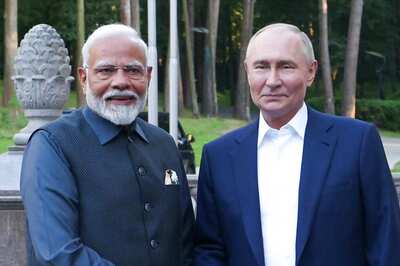
views
The Meaning and Origin of Kun Faya Kun
Kun Faya Kun means “Be, and it is.” It appears in Arabic as كُنْ فَيَكُونُ and is pronounced "KOON-fa-yaa-Koon.” Kun faya kun breaks down as follows: "Kun" (کن) means "be,” "fa" (ف) acts as a conjunction meaning "then,” and "yakun," (یکون) means "it becomes/is."
It appears in the Quran as a reminder of Allah’s endless power. The phrase states that God has the power to create anything he wants to at the same moment he wills it. It can help you learn more about Islam by understanding that anything that happens within the universe is under Allah’s control, and happens because of him.
Kun Faya Kun Song & Lyrics
“Kun Faya Kun” is a song from the 2011 Bollywood film Rockstar. It’s referred to as a “qawwali ghazal,” a religious song that uses the Sufi qawwali musical style and the ghazal form of poetry. The Qawwali musical style combines elements of music, poetry, and Sufism. It’s often used by mystics to spread love for God and offer wishes for peace. A Ghazal is a poem with 5-12 rhyming couplets (shers) made up of adoring words aimed directly at one’s beloved that uses themes of love and longing.
“Kun Faya Kun”Ya Nizamuddin Auliya, Ya Nizamuddin Salqa(“Oh Ruler of the Saints, Oh Ruler of the crestfallen”)Kadam Badhaa Le, Hadon Ko Mitaa Le,Aaja Khaali Pan Mein Pee Ka Ghar Tera,Tere Bin Khaali Aaja, Khali Pan MeinTere Bin Khaali Aaja, Khali Pan Mein(“Take a step forward, destroy these distancesCome into this void, the home of your belovedWithout you there is emptiness, come into this void”)He who fills me with colorKun Faya Kun(“He said, Be, & it is!”)Jab Kahin Pe Kuch Nahi.Bhi Nahi ThaWahi Tha Wahi ThaWahi Tha Wahi Tha(“When, there was nothing,He was the one,the only one.”)Woh Jo Mujh Mein SamayaWoh Jo Tujh Mein SamayaMaula Wahi Wahi Maaya(“He is the one who is in my soul,He is the one in your soul,O dear Lord, He is the one that is mystery”)Kun Faya Kun, Kun Faya KunSadaqAllahul-alliyul-Azeem(“He said, Be, & it is! Be, & it is!The truth is Allah, the sublime, the magnificent”)Rangreza Rang Mera Tan Mera Mann,Le Le Rangaayi Chaahe Tan Chaahe Mann,(“My painter, color my body, my soulTake away the colors, from the body, from the soul”)Sajra Savera Mere Tan BarseKajra Andhera Teri Jalti LauQatra Mila Jo Tere Dar Par SeO Maula… Maula…(“The Morning showers (blessings) rain on meAnd it cleans up the dark soul of mine which is like the darkness of night. It's only for the drop of nourishment that flows from yours,Oh Lord…”)Kun Faya Kun, Kun Faya Kun(“He said, Be, & it is! Be, & it is!”)SadaqAllahul-alliyul-AzeemSadaqa Rasulu-hun nabi-yun-kareemSallallaahu Alayhi Wasallam(“The truth is Allah, the sublime, the magnificentThe truth is his ApostleMay the blessing and peace be upon him”)O Mujhpe Karam Sarkar TeraAraz Tujhe, Karde Mujhe, Mujhse Hi RihaAb Mujhko Bhi Ho, Deedaar MeraKarde Mujhe, Mujhse Hi RihaMujhse Hi Rihaaaaaaaa(“It would be your generosity upon me, Oh masterMy request, Free me from myselfEven I should see myselfMake me free from myselfFrom myself…”)Mann Ke Mere Ye Bharam,Kachche Mere Ye KaramLeke Chale Hai Kahaan,Main Toh Jaanoon Hi Na(“There is a mirage in my mindFor the weakness of my actionsHave got me where…I am lost…”)Tu Hai Mujhmein Samaya,Kahaan Leke Mujhe Aaya,Main Hoon Tujhmein Samaya,Tere Peeche Chala Aaya,(“You are in me,Where have you brought meI have given myself to you,In your footsteps, I follow”)Tera Hi Main Ek Saaya,Tune Mujhko Banaya,Main Toh Jag Ko Na Bhaaya,Tune Gale Se LagayaAb Tu Hi Hai Khudaya,Sach Tu Hi Hai Khudaya(“I am your shadowYou have created meI didn’t fit in the worldYet you embraced meOnly you are the Just,Only you are the Truth…”)Kun Faya KunKun Faya Kun…(He said, Be, & it is!Be, & it is!”)Written by A. R. Rahman, Javed Ali, and Mohit Chauhan
Kun Faya Kun in the Quran
Al-Baqarah 117 "He is the Originator of the heavens and the earth! When He decrees a matter, He simply tells it, "Be!" And it is!” (بَدِيعُ ٱلسَّمَٰوَٰتِ وَٱلۡأَرۡضِۖ وَإِذَا قَضَىٰٓ أَمۡرٗا فَإِنَّمَا يَقُولُ لَهُۥ كُن فَيَكُونُ) What it means: This phrase illustrates the supreme power of Allah over all that is.
An-Nahl 16:40 “If we ever will something to exist, all we say is: “Be!” And it is!” (إِنَّمَا قَوْلُنَا لِشَىْءٍ إِذَآ أَرَدْنَـٰهُ أَن نَّقُولَ لَهُۥ كُن فَيَكُونُ) What it means: Whatever God desires, he can bring into being with just a word or a thought.
Maryam 19:35 “It is not for Allah to take a son! Glory be to Him. When He decrees a matter, He simply tells it, “Be!” And it is!” (مَا كَانَ لِلَّهِ أَن يَتَّخِذَ مِن وَلَدٍۢ ۖ سُبْحَـٰنَهُۥٓ ۚ إِذَا قَضَىٰٓ أَمْرًۭا فَإِنَّمَا يَقُولُ لَهُۥ كُن فَيَكُونُ) What it means: This phrase states that it is beneath Allah to have a son, because he can simply make anything exist solely by using his limitless will.
Al-Imran 47 "She (Maryam) said: "How can I have a son, O Lord, when no man has touched me?" He said: "That is how God creates what He wills. When He decrees a thing, He says 'Be,' and it is." (قَالَتۡ رَبِّ أَنَّىٰ يَكُونُ لِي وَلَدٞ وَلَمۡ يَمۡسَسۡنِي بَشَرٞۖ قَالَ كَذَٰلِكِ ٱللَّهُ يَخۡلُقُ مَا يَشَآءُۚ إِذَا قَضَىٰٓ أَمۡرٗا فَإِنَّمَا يَقُولُ لَهُۥ كُن فَيَكُونُ) What it means: This phrase relates to a woman who must give birth without being married and demonstrates Allah’s power over mankind and all things in creation.
Al-Imran 59 "For God, the likeness of Jesus is as that of Adam whom He fashioned out of dust and said "Be," and he was." (إِنَّ مَثَلَ عِيسَىٰ عِندَ ٱللَّهِ كَمَثَلِ ءَادَمَۖ خَلَقَهُۥ مِن تُرَابٖ ثُمَّ قَالَ لَهُۥ كُن فَيَكُونُ) What it means: Allah is describing the creation of Adam, the first man, and comparing him to Jesus, as both were said to not have a father.
Al-Anaam 73 "It is He who created the heavens and the earth with a definite purpose. The day He will say "Be," it will be. His words are the truth, His alone the power on the day when the blast of the trumpet will be sounded. He knows the hidden and the visible. He is all-prudent and all-knowing." (وَهُوَ ٱلَّذِى خَلَقَ ٱلسَّمَـٰوَٰتِ وَٱلْأَرْضَ بِٱلْحَقِّ ۖ وَيَوْمَ يَقُولُ كُن فَيَكُونُ ۚ قَوْلُهُ ٱلْحَقُّ ۚ وَلَهُ ٱلْمُلْكُ يَوْمَ يُنفَخُ فِى ٱلصُّورِ ۚ عَـٰلِمُ ٱلْغَيْبِ وَٱلشَّهَـٰدَةِ ۚ وَهُوَ ٱلْحَكِيمُ ٱلْخَبِيرُ) What it means: Allah draws attention to his infinite power over all other creations.
Ya-Sin 77-82 “Do people not see that We have created them from a sperm drop, then—behold!—they openly challenge us? And they argue with us—forgetting they were created—saying, “Who will give life to decayed bones?” Say, o prophet, “They will be revived by the one who produced them the first time, for He has perfect knowledge of every created being. He is the one who gives you fire from green trees, and—behold!—you kindle fire from them. Can the one who created the heavens and the earth not easily resurrect these deniers?” Yes, He can! For He is the master creator, all-knowing. All it takes, when He wills something to be, is simply to say to it: “Be!” And it is!” (أَوَلَمْ يَرَ ٱلْإِنسَـٰنُ أَنَّا خَلَقْنَـٰهُ مِن نُّطْفَةٍۢ فَإِذَا هُوَ خَصِيمٌۭ مُّبِينٌۭ ٧٧ أَوَلَمْ يَرَ ٱلْإِنسَـٰنُ أَنَّا خَلَقْنَـٰهُ مِن نُّطْفَةٍۢ فَإِذَا هُوَ خَصِيمٌۭ مُّبِينٌۭ ٧٧ قُلْ يُحْيِيهَا ٱلَّذِىٓ أَنشَأَهَآ أَوَّلَ مَرَّةٍۢ ۖ وَهُوَ بِكُلِّ خَلْقٍ عَلِيمٌ ٧٩ ٱلَّذِى جَعَلَ لَكُم مِّنَ ٱلشَّجَرِ ٱلْأَخْضَرِ نَارًۭا فَإِذَآ أَنتُم مِّنْهُ تُوقِدُونَ أَوَلَيْسَ ٱلَّذِى خَلَقَ ٱلسَّمَـٰوَٰتِ وَٱلْأَرْضَ بِقَـٰدِرٍ عَلَىٰٓ أَن يَخْلُقَ مِثْلَهُم ۚ بَلَىٰ وَهُوَ ٱلْخَلَّـٰقُ ٱلْعَلِيمُ إِنَّمَآ أَمْرُهُۥٓ إِذَآ أَرَادَ شَيْـًٔا أَن يَقُولَ لَهُۥ كُن فَيَكُونُ) What it means: These verses discuss the neverending power of God versus the limits of human ability in connection with the nature of all creation.
Ghafir 40:68 “He is the one who gives life and causes death. When He decrees a matter, He simply tells it, “Be!” And it is!” (هُوَ ٱلَّذِى يُحْىِۦ وَيُمِيتُ ۖ فَإِذَا قَضَىٰٓ أَمْرًۭا فَإِنَّمَا يَقُولُ لَهُۥ كُن فَيَكُونُ ٦٨) What it means: This verse refers to Allah as “the forgiver,” emphasizing the fact that he can forgive sins, as well as the power to both give and take away life.
Kun Faya Kun Meaning FAQ
When did Allah say Kun Faya Kun? Kun faya kun appears multiple times when citing the Quran. Allah uses kun faya kun to demonstrate the power of creating something from nothing. The phrase emphasizes how when Allah would like something to happen, he can make it happen immediately.
What is the meaning of Faya in Islam? Faya is mostly used as part of the phrase, kun faya kun, where it breaks down to “fa,” a conjunction meaning “then,” and “ya,” meaning “it,” as part of “yakun.” In kun faya kun, it contributes to the overall meaning, which suggests that Allah’s limitless power can cause all things to happen.
Is kun faya kun used in prayers in Islam? The Arabic phrase, kun faya kun, is not part of any direct prayer used by Muslims. It’s mostly an expression that signifies the great and absolute power of God. Muslims who want to include kun faya kun in their personal supplications or when asking dua can when they want to call attention to the boundless power of God in their lives.
What does kun faya kun mean in Sufism? As in Islam, kun faya kun means “Be, and it is” in Sufism. Its meaning still revolves around the idea of God’s power being so great that it can will anything to exist. If you want to learn about Sufism by applying this phrase, you can use it to be closer to Allah and both align yourself and surrender to his will in order to to experience peace and find unity with your divine creator.

















Comments
0 comment